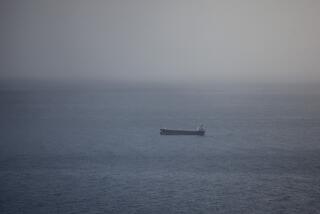Attack aimed at British ambassador in Yemen raises alarm
Reporting from Cairo — The attempted assassination of the British ambassador to Yemen on Monday indicated that an Al Qaeda branch remains capable of striking Western targets despite the arrests of some of its leaders and raids against its mountainous strongholds in the Arabian Peninsula.
A lone suicide bomber detonated an explosives belt alongside the armored car carrying Ambassador Timothy Torlot on his morning drive to the British Embassy in the capital, Sana. The ambassador and other British staff were unharmed. Police said the bomber, whose name was not released, was the only casualty.
Witnesses said two policemen escorting the ambassador’s motorcade were lightly injured. Security officials and bystanders said the assailant spotted the ambassador’s convoy and walked to a median strip, where he blew himself up near a concrete divider less than one mile from the British and U.S. embassies.
The blast “was very loud,” said Halal Hamid Bisani, a military officer who lives near the site of the bombing in an area known as Berlin Gardens. “There are lots of houses around here with broken windows.”
A spokesman for the British Foreign Office said: “There was a small explosion beside the British ambassador’s car. He was unhurt. No other embassy staff or British nationals were injured.”
No group claimed responsibility for the bombing, but the attack came as the Yemen military — backed by U.S. training and intelligence — has been targeting Al Qaeda in the Arabian Peninsula with airstrikes and ground offensives. The Yemen-based group, which had a resurgence several years ago, was behind the alleged attempt to bomb a U.S. airliner on Christmas Day and is believed to have orchestrated a botched attack on a Saudi prince.
Washington is concerned that the Al Qaeda branch will bring further instability and bloodshed to the crossroads of the Middle East and the Horn of Africa. The Pentagon is increasing security assistance to Sana this year from $67 million to $150 million, including funding for Yemen’s special forces that have stepped up attacks on the militant group following U.S. pressure on President Ali Abdullah Saleh.
This month, President Obama ordered the capture or killing of U.S.-born Muslim cleric Anwar Awlaki, who is reportedly operating in Yemen. Awlaki had links to the Nigerian student accused of attempting to blow up the U.S. airliner and was in e-mail contact with Nidal Malik Hasan, an Army major charged last year in the killing of 13 people during a rampage at Ft. Hood, Texas.
American intelligence officials regard Yemen’s Al Qaeda offshoot, made up mainly of Yemenis and Saudis, as a major threat to U.S. regional interests. Recent media reports suggest some of the group’s leaders may have slipped across the Gulf of Aden to join with Islamic radicals in Somalia. The assertions could not be independently confirmed.
Washington has been skeptical of Saleh’s government, which for years tolerated militants as long as they carried out attacks in other countries. Sana’s sentiments appeared to shift late last year, however, when the militant group became a threat to Saleh, who was also contending with a civil war in the north and a secessionist movement in the south.
The British Foreign Office website states: “We believe that terrorists continue to plan attacks. Attacks could be indiscriminate, including against Western and British interests, such as residential compounds, military and oil facilities, and transport and aviation interests.”
A 2008 car bomb attack on the U.S. Embassy in Sana killed at least 16 people, including militants.
Special correspondent Haley Sweetland Edwards in Sana contributed to this report.
More to Read
Sign up for Essential California
The most important California stories and recommendations in your inbox every morning.
You may occasionally receive promotional content from the Los Angeles Times.











